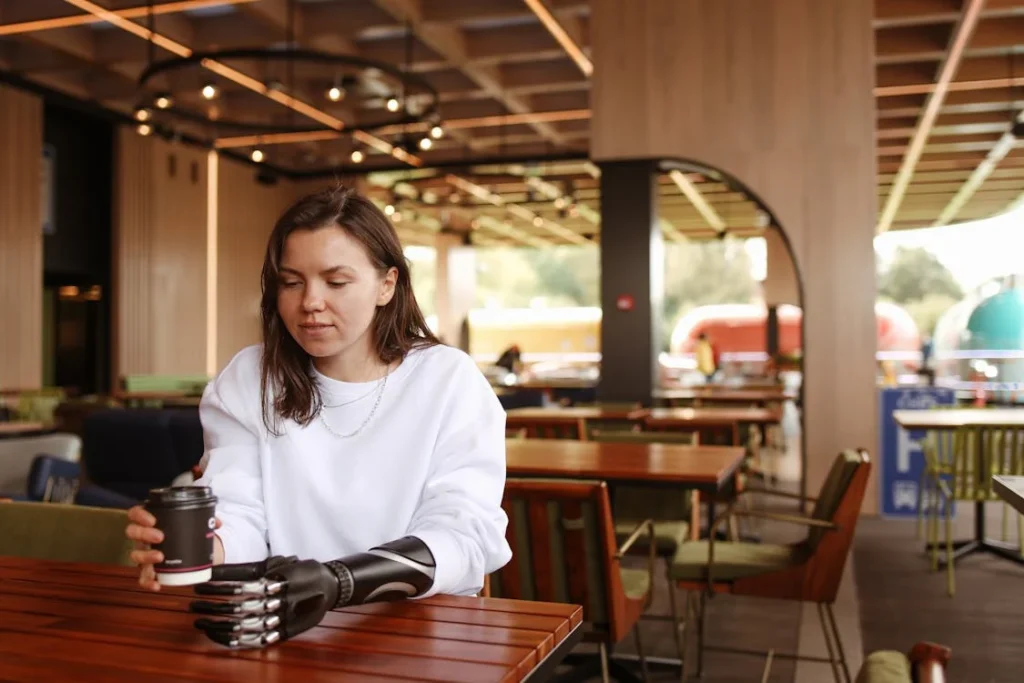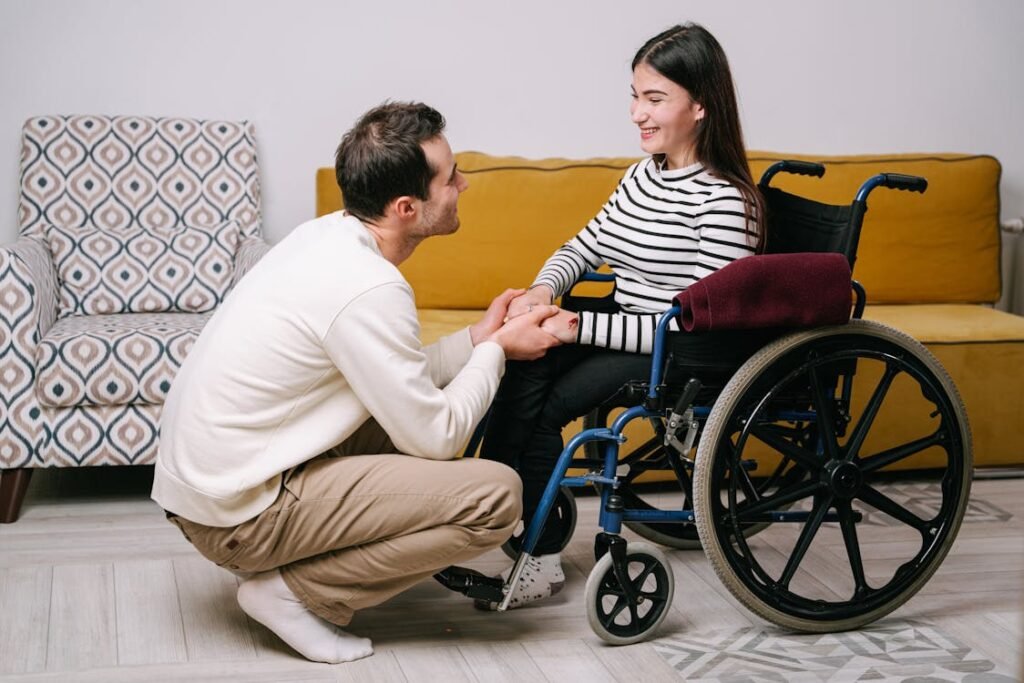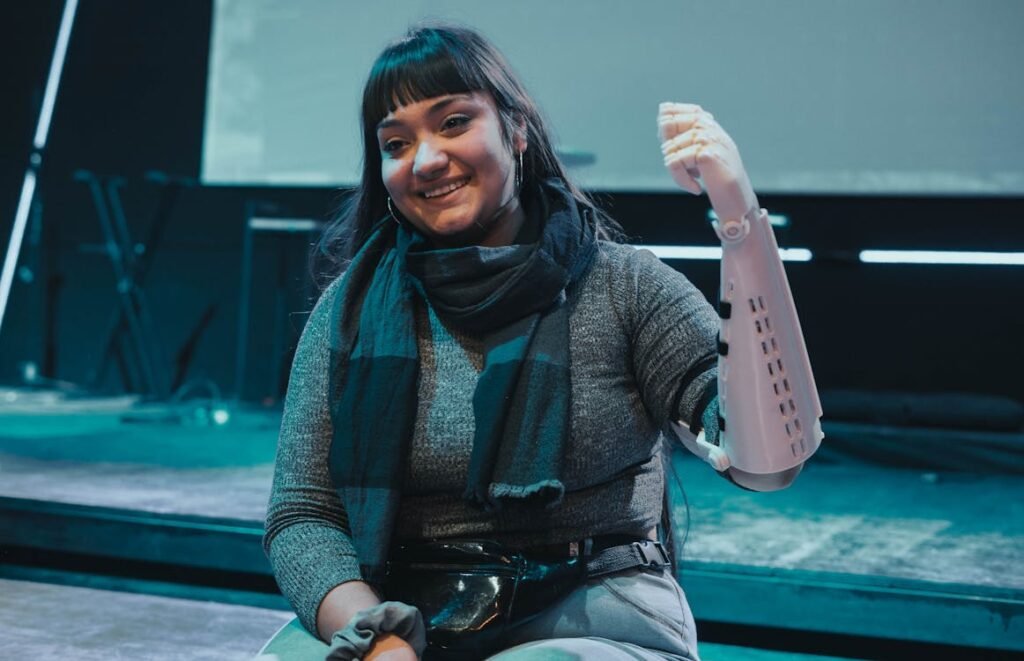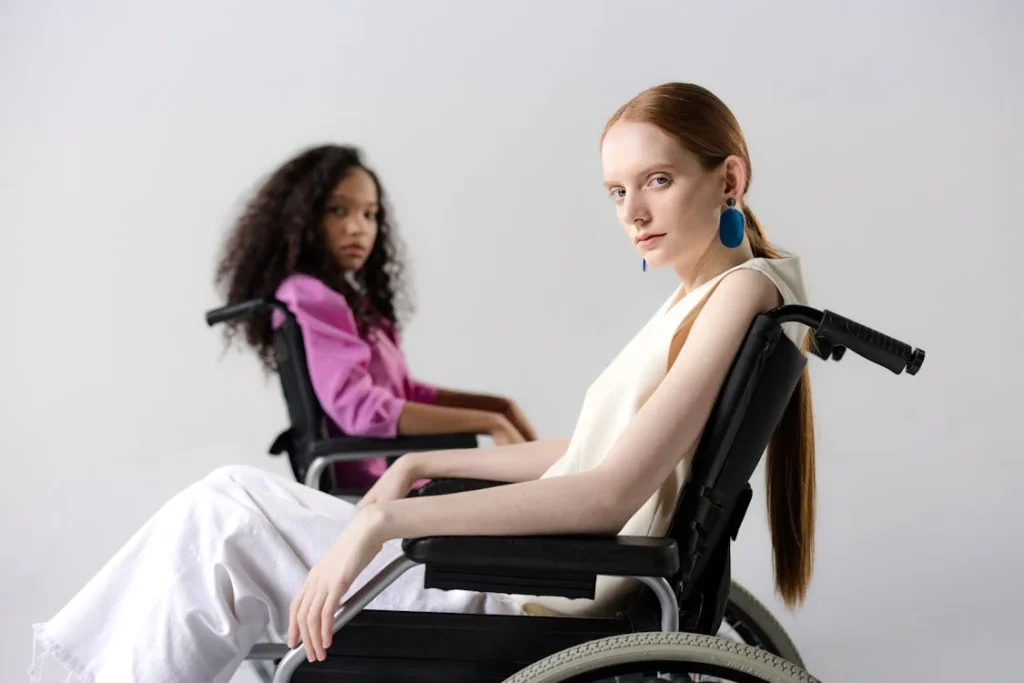Women with disabilities face a double challenge. They are often marginalized not just because of their disability, but also because of their gender. In many cultures, traditional beliefs about women’s roles and abilities limit their opportunities, making it even harder for them to access education, employment, healthcare, and social inclusion.
The stigma around disability is already strong in many societies. When combined with gender bias, it creates barriers that prevent women from living independent, fulfilling lives. A man with a disability may still be seen as strong, capable, or worthy of support. A woman with a disability, on the other hand, may be seen as a burden, unable to marry, have children, or contribute meaningfully to her family.
Social media, advocacy, and technological advancements—including assistive devices and prosthetics—are helping to change this reality. But breaking these barriers requires not only better policies but also a cultural shift in how society perceives women with disabilities.
At Robobionics, we are committed to empowering all individuals with disabilities. By addressing the specific challenges women face, we can work toward a more inclusive world where disability is not a limitation but simply one aspect of a person’s identity.

The Struggles of Visibility: Women with Disabilities in Society
In many traditional societies, women with disabilities are often hidden from public life. Cultural norms dictate that women should be caregivers, homemakers, or dependent on male relatives.
When a woman has a disability, these expectations become even more restrictive, making it difficult for her to be seen as independent or capable.
The Burden of Stigma and Social Isolation
Women with disabilities frequently experience social isolation, sometimes even within their own families. In cultures where physical ability is closely tied to marriageability and social status, a disability can lead to rejection or neglect.
Some families believe that a disabled daughter will not find a husband, so they may limit her education or keep her out of public spaces to avoid judgment from the community.
This stigma is especially harmful when it prevents women from accessing opportunities that could improve their lives. In some cases, women with disabilities are discouraged from working or pursuing higher education, even when they are fully capable.
They are often overprotected to the point that they are denied basic freedoms, making it even harder for them to gain confidence and independence.
In rural areas, where disability is still misunderstood, women with disabilities may face even greater discrimination.
Some communities see disability as a curse or punishment, leading to social rejection. Without support networks, many of these women live in complete dependency, unable to access the resources that could help them live fulfilling lives.
Access to Healthcare: A Gendered Challenge
Healthcare systems in many countries are not designed to address the specific needs of women with disabilities. From routine check-ups to maternal healthcare, women with disabilities often struggle to access services that are readily available to others.
Medical facilities are frequently inaccessible, with hospitals and clinics lacking ramps, sign language interpreters, or trained staff who understand how to treat patients with disabilities.
This makes it harder for women to seek medical care, leading to undiagnosed or untreated health conditions.
In reproductive healthcare, the barriers are even greater. Many doctors hold unconscious biases about women with disabilities, assuming that they are not sexually active or will never have children.
As a result, women with disabilities may be denied proper gynecological care, family planning services, or prenatal support. Some are even pressured into sterilization or birth control without proper consent, as families and doctors assume that they are incapable of raising children.
The lack of accessible healthcare extends to mental health as well. Women with disabilities are more likely to experience depression and anxiety due to social exclusion, yet they often have limited access to counseling or psychological support.
The stigma surrounding both disability and mental health creates a cycle where women suffer in silence, unable to seek the help they need.
The Intersection of Disability and Gender-Based Violence
One of the most alarming challenges faced by women with disabilities is their increased vulnerability to violence and abuse. Studies show that women with disabilities are at a higher risk of experiencing domestic violence, sexual assault, and exploitation.
Because they are often dependent on caregivers, partners, or family members, women with disabilities may have fewer ways to escape abusive situations.
Many are financially reliant on their abusers, or they may struggle to access safe shelters and legal assistance due to physical barriers or discrimination.
In some cases, perpetrators target women with disabilities because they believe they are less likely to report the abuse.
The justice system is often not designed to support disabled women, with police officers and legal professionals lacking the training to handle cases involving individuals with disabilities. This creates an environment where many women feel powerless to seek justice.

Barriers to Education and Employment
Education and employment are crucial for independence, yet women with disabilities often face overwhelming barriers in these areas.
Cultural norms, lack of accessibility, and gender bias make it difficult for them to pursue their ambitions, limiting their ability to achieve financial security and self-sufficiency.
Limited Access to Education
In many societies, girls already face obstacles in accessing education due to gender biases. When a girl has a disability, these barriers multiply.
Families may see educating a disabled daughter as unnecessary, believing that she will never be able to work or contribute financially. Instead of investing in her education, resources are often directed toward male siblings.
Even when girls with disabilities are allowed to attend school, accessibility remains a challenge. Many schools lack ramps, assistive technology, or teachers trained to accommodate different types of disabilities.
Girls who use prosthetics or mobility aids may struggle with physical barriers, while those with visual or hearing impairments often find themselves without the support they need to fully participate in learning.
The social aspect of education can also be difficult. Disabled girls may face bullying or discrimination from classmates, leading to low self-esteem and social withdrawal.
Without encouragement from teachers and peers, many drop out early, further limiting their opportunities in adulthood.
The Struggle for Employment and Financial Independence
A lack of education creates a ripple effect, making it harder for women with disabilities to find employment. But even those who complete their studies often face discrimination in the job market.
Employers may assume that a disabled woman cannot handle certain tasks, or they may be reluctant to invest in workplace accommodations.
In cultures where women’s financial independence is already discouraged, disabled women face even more resistance when trying to enter the workforce.
Many companies fail to provide accessible workspaces or flexible job roles that allow women with disabilities to thrive. In some cases, women are offered only low-paying or informal jobs, reinforcing their dependence on family members or caregivers.
Women with disabilities who want to start their own businesses face additional obstacles. Access to loans, business training, and networking opportunities is often limited.
Banks and investors may hesitate to support female entrepreneurs with disabilities, assuming that their ventures will not be successful. This financial exclusion makes it difficult for disabled women to break free from the cycle of dependency.
At Robobionics, we believe that economic empowerment is key to breaking these barriers. Assistive technology, including advanced prosthetics, can help women with disabilities become more independent and active in the workforce.
By creating more opportunities for employment and entrepreneurship, society can ensure that disabled women are not left behind.

Marriage, Relationships, and Family Expectations
Cultural norms around marriage and family life often create additional challenges for women with disabilities. In many societies, a woman’s worth is closely tied to her ability to marry, have children, and manage a household.
When a woman has a disability, she is frequently seen as less “desirable” or incapable of fulfilling traditional roles, leading to discrimination in relationships and family life.
The Stigma of Disability in Marriage
Marriage is often viewed as a measure of success for women, particularly in traditional cultures where a woman’s primary role is seen as that of a wife and mother.
However, women with disabilities often find themselves excluded from these expectations. Families may assume that no one will want to marry a disabled woman, leading them to discourage their daughters from considering marriage altogether.
Even when women with disabilities do seek marriage, they often face rejection due to societal bias. Some families hide a daughter’s disability during marriage negotiations, fearing that revealing it will lead to a broken engagement.
Others agree to marriages where their daughter may be treated poorly, simply because they believe any marriage is better than none.
For those who do marry, challenges often continue within the household. Some women find themselves expected to perform household duties without proper accommodations, despite their physical limitations.
Others face emotional neglect, as their partners or in-laws may view them as a burden rather than an equal partner. In extreme cases, women with disabilities are abandoned or divorced when they are deemed “unfit” for marriage.
Motherhood and the Right to Have a Family
Beyond marriage, the idea of motherhood is another area where cultural norms create significant obstacles for women with disabilities. In many societies, it is assumed that a woman with a disability cannot, or should not, become a mother.
These assumptions are based on outdated beliefs rather than medical facts.
Doctors and families may pressure women with disabilities to avoid pregnancy, believing that they will be unable to care for a child. Some women are even subjected to forced sterilization or denied access to fertility treatments because of these biases.
This violation of reproductive rights strips disabled women of their agency, reinforcing the belief that they are incapable of making decisions about their own bodies.
For women with disabilities who do become mothers, the journey is often filled with judgment and lack of support. They may be questioned about their parenting abilities, even when they are fully capable of raising a child.
Social services in some countries have even been known to remove children from disabled mothers, assuming that they cannot provide adequate care.
The reality is that with the right support and accommodations, many women with disabilities successfully raise children. Adaptive parenting tools, community support systems, and assistive technology can help mothers with disabilities care for their families just like any other parent.
Changing societal attitudes is crucial to ensuring that disabled women are not denied the right to build a family on their own terms.
At Robobionics, we believe that no woman should be limited by outdated cultural beliefs. Whether it is through providing assistive devices like Grippy™, or advocating for greater inclusivity in healthcare and family life, we are committed to ensuring that women with disabilities have the opportunity to live full, independent lives.

The Role of Assistive Technology in Empowering Women with Disabilities
One of the most effective ways to challenge cultural barriers is through technology. For women with disabilities, assistive devices such as prosthetics, wheelchairs, and adaptive tools can provide newfound independence, allowing them to participate more fully in education, employment, and family life.
However, access to such technology is often limited by financial constraints, lack of awareness, and societal attitudes that discourage women from using these devices.
Prosthetics as a Path to Independence
In many cultures, disability is associated with dependence, but modern prosthetic technology is proving otherwise. With advancements in materials, design, and functionality, prosthetic limbs can now restore mobility, dexterity, and confidence.
Women with upper-limb prosthetics, for example, can perform daily tasks more efficiently, whether it is taking care of their children, cooking, or pursuing a career.
At Robobionics, we have seen firsthand how women using prosthetic limbs like Grippy™ regain control over their lives. These devices are not just medical tools; they are instruments of empowerment that enable women to challenge the stereotypes that label them as incapable.
Overcoming Cultural Resistance to Assistive Devices
Despite the benefits, many women hesitate to use prosthetics due to cultural stigma. In some communities, wearing a prosthetic limb is seen as unnatural or shameful, leading women to hide their disability rather than embrace assistive technology.
Some families discourage their daughters from using prosthetics, fearing that it will make them less “marriageable” or draw unwanted attention.
This resistance can be addressed through awareness campaigns that highlight the success stories of women who use assistive devices.
Representation in media, education, and workplaces can help normalize prosthetic use, making it clear that these devices enhance rather than diminish a person’s identity.
Financial Barriers and Accessibility
Cost remains one of the biggest obstacles preventing women from accessing prosthetic limbs and other assistive technologies.
Many families, especially in lower-income communities, prioritize resources for able-bodied male members, leaving women with disabilities without the financial means to obtain life-changing devices.
To address this, governments and organizations must introduce subsidies, financial aid, and insurance coverage that specifically support women with disabilities.
Nonprofit initiatives and social enterprises are also playing a key role in making prosthetics more affordable and accessible, ensuring that no woman is denied independence due to economic limitations.
The Need for Gender-Inclusive Design in Prosthetics
Most prosthetic designs have historically been created with men in mind, often overlooking the unique needs of women.
Women require prosthetic limbs that are lighter, more adaptable to different outfits and cultural dress codes, and better suited for tasks traditionally associated with their roles.
At Robobionics, we prioritize inclusivity in our prosthetic designs, ensuring that our products cater to the specific needs of women. By offering more customizable, ergonomic, and aesthetically pleasing options, we empower women to feel comfortable and confident using prosthetic limbs in their daily lives.

Changing Cultural Attitudes Through Advocacy and Representation
Cultural perceptions of disability will not change overnight, but advocacy and representation are powerful tools in shifting mindsets. When women with disabilities are visible in leadership, media, and public life, it challenges the outdated beliefs that hold them back.
Advocacy efforts are pushing for better policies, while social media and storytelling are helping to reshape how society views disabled women.
The Power of Representation in Media and Society
For generations, women with disabilities have been underrepresented in media, fashion, and leadership roles. When they did appear, they were often portrayed in ways that emphasized pity rather than empowerment.
However, social media has given disabled women a platform to share their own narratives.
Today, disability influencers, activists, and professionals are using digital platforms to redefine what it means to be a woman with a disability.
By showcasing their careers, personal lives, and achievements, they are proving that disability is not a limitation but just one aspect of their identity. These role models inspire younger generations to dream bigger, seek education, and fight for their rights.
Mainstream media is also beginning to embrace inclusivity. More brands are featuring women with disabilities in advertisements, proving that beauty and success are not limited by physical ability.
The presence of disabled women in politics, business, and entertainment is slowly shifting cultural attitudes, making it clear that they deserve the same opportunities as everyone else.
Community-Led Advocacy for Policy Change
Grassroots advocacy groups and disability rights organizations play a crucial role in pushing for gender-inclusive policies. These efforts focus on improving accessibility in education, healthcare, employment, and public spaces.
Women with disabilities are increasingly becoming advocates for their own rights, leading movements that demand systemic change.
One of the most significant policy shifts happening globally is the push for disability-inclusive gender policies. Governments and organizations are recognizing that addressing gender inequality must also include women with disabilities.
This means ensuring that women with disabilities are part of policy discussions, not just as beneficiaries but as decision-makers.
The Role of Families and Communities
Change must also happen at the community level. Many of the barriers women with disabilities face come from within their own families and local cultures.
When families support and empower their daughters, sisters, and wives with disabilities, they create a foundation for greater societal change.
Education programs targeting families, schools, and workplaces can help break down long-held misconceptions. When communities see disabled women thriving—whether through work, education, or entrepreneurship—it challenges the stereotypes that have persisted for generations.
At Robobionics, we believe that true inclusion happens when women with disabilities are given equal opportunities to succeed. Whether through better prosthetic solutions, advocacy, or awareness campaigns, we are committed to helping break the barriers that hold them back.

Building a More Inclusive Future for Women with Disabilities
The road to equality for women with disabilities is long, but progress is being made. As societies recognize the unique challenges disabled women face, more efforts are being directed toward creating inclusive environments.
By combining policy changes, technological advancements, and cultural shifts, the future can be one where disability is no longer a barrier to opportunity.
Education and Skill Development as a Foundation for Change
One of the most effective ways to empower women with disabilities is through education and skill development.
When girls with disabilities receive the same quality of education as their peers, they gain the knowledge and confidence needed to pursue careers and financial independence.
Investing in accessible schools, scholarships, and vocational training programs ensures that disabled women are not left behind.
Skill development programs also play a crucial role in bridging the employment gap. By providing training in fields such as technology, entrepreneurship, and the arts, these programs create pathways for disabled women to enter industries where they have been historically underrepresented.
Remote work opportunities and flexible job roles are also making it easier for women with disabilities to find meaningful employment.
The Role of Technology in Creating Independence
Assistive technology, including prosthetics, mobility aids, and digital accessibility tools, is transforming the lives of women with disabilities.
Innovations such as AI-powered prosthetic limbs, voice-controlled devices, and adaptive communication apps are breaking barriers that once seemed insurmountable.
At Robobionics, we believe that technology should empower, not exclude. By designing prosthetics that are affordable, lightweight, and customized to individual needs, we help women with disabilities regain control over their lives.
These advancements are not just about mobility—they are about restoring confidence, independence, and the ability to participate fully in society.
Changing Laws and Policies for Greater Inclusion
Legal protections for women with disabilities are improving, but there is still work to be done. Stronger enforcement of disability rights laws, better workplace protections, and gender-sensitive policies are needed to address discrimination at all levels.
Governments must ensure that women with disabilities have access to healthcare, financial support, and job opportunities. Businesses should implement inclusive hiring practices, while public institutions must focus on making spaces accessible. Without policy support, social change will be slower and harder to sustain.
A Collective Effort Toward Equality
True change happens when governments, businesses, communities, and individuals work together. Families must encourage their daughters to pursue their dreams, schools must accommodate diverse learning needs, and workplaces must break biases against disabled employees.
Women with disabilities should not have to fight for basic rights—they should be supported in reaching their full potential. The future must be one where no woman is excluded because of her physical condition.
At Robobionics, we are committed to this vision. By providing life-changing prosthetic solutions and supporting disability inclusion efforts, we aim to help create a world where every woman, regardless of ability, has the chance to succeed.
Conclusion
Women with disabilities face unique challenges shaped by cultural norms, gender bias, and societal expectations. From limited access to education and employment to barriers in healthcare and relationships, their struggles often go unnoticed. However, change is happening. Advocacy, technology, and inclusive policies are helping to break these barriers and create opportunities for disabled women to thrive.
Social attitudes must continue evolving to ensure that disability is not seen as a limitation but as a part of human diversity. Families, communities, and governments all have a role to play in creating an inclusive world where women with disabilities can access education, careers, and relationships without discrimination.
At Robobionics, we are dedicated to empowering women through advanced prosthetic technology, helping them regain independence and confidence. True inclusion means ensuring that no woman is held back by outdated beliefs or lack of support. By challenging cultural stigma and embracing innovation, we move closer to a future where all women—regardless of ability—have the freedom to live, work, and dream without limits.



